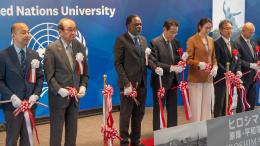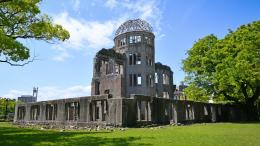How has the UN’s rule of law support contributed to lowering the risks of violent conflict? A major new report based on eight in-depth case studies conducted by UNU-CPR - in close consultation with relevant UN peace operations, agencies and field offices - explores this question and sets out an actionable framework for rule of law policymakers and practitioners.
In 2016, the UN Security Council and General Assembly came together to express a unified commitment to the concept of “sustaining peace” based on a common understanding that conflict prevention should be undertaken by all pillars of the UN and should address the root causes of conflict. Following the Sustaining Peace resolutions and the Secretary-General’s subsequent report on peacebuilding, the UN has increasingly mainstreamed its rule of law work, from its role in peace operations to the broad array of programmatic support by offices, agencies, funds and programmes.
The UN’s rule of law work has been increasingly understood as crucial to conflict prevention: working towards effective, transparent, and inclusive rule of law institutions can reduce the risks of violent conflict, helping to address structural and root causes of social and political inequalities and unrest by building more resilient and just societies, while also bolstering the more immediate capacities of States to address conflict risks. Indeed, Sustainable Development Goal 16 captures this link between inclusive rule of law institutions and longer-term stability, demanding that UN programming help to bolster equitable access to justice and institutional capacities for all.
The Executive Office of the Secretary-General of the United Nations, with the support of the Global Focal Point for the Rule of Law (GFP), commissioned United Nations University Centre for Policy Research to conduct a series of case studies on the UN’s rule of law work. Specifically, this project asked how the UN’s rule of law work has contributed to the goals of conflict prevention by reducing the risk of escalation into violent conflict, helping to build more resilient, inclusive institutions, and contributing to the kind of structural transformations that many fragile and conflict-affected settings require to achieve long-term stability and sustainable development.
The study considers how the UN’s rule of law work may have contributed to prevention in a range of ways, including by supporting political processes, building inclusive national capacities, restoring the basic functioning of justice institutions in the aftermath of conflict, contributing to the fight against impunity for crimes fuelling conflicts, addressing humanitarian and development priorities, and helping the UN system respond to other crises.
The cases were selected to cover a range of settings and reflect the breadth of the UN’s rule of law work. The cases offer insights into both the types of rule of law interventions and the ways in which country contexts may enable or inhibit the UN’s ability to have a strong impact on conflict prevention.
To position the UN’s rule of law work conceptually at the centre of the UN’s broader conflict prevention and sustaining peace priority, the authors draw on these studies to evaluate the extent to which the UN’s rule of law engagements may have helped reduce the risks of violent conflict. This analysis provides lessons and guidance to policymakers and practitioners on how to design and implement effective rule of law strategies in a range of settings. In order to build an effective rule of law strategy that is likely to impact the risks of violent conflict, the framework proposes that rule of law programming should be based on nine steps.
Research outputs:
- Full volume
- Overarching Paper
- Afghanistan case study
- Bangladesh case study
- Bosnia and Herzegovina case study
- Central African Republic case study
- Colombia case study
- Democratic Republic of the Congo case study
- Lebanon case study
- Mali case study
This project was commissioned by the Executive Office of the Secretary-General of the United Nations and the co-chairs of the Global Focal Point for the Rule of Law. The views expressed are those of the authors and not necessarily those of the United Nations Secretariat.


